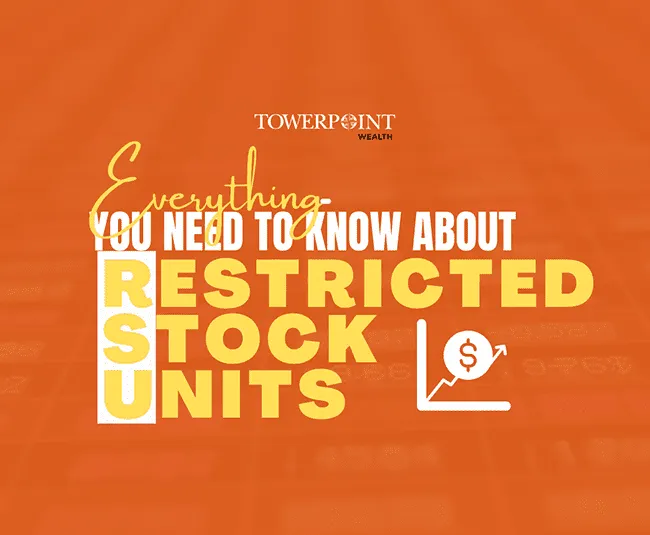Compensation packages for directors, VPs, software engineers, or other employees of technology based firms almost always contain restricted stock units, or RSUs. If you own RSUs, you may be asking one or more of the most common questions about RSUs:
Maximize stock compensation
Stock options vs RSU
How are restricted stock units taxed?
RSU selling strategy to mitigate the tax burden
Does your RSU selling strategy grow net worth?
Maximize stock compensation | RSUs in your compensation package can become a substantial part of your overall net worth.
Maximize stock compensation and RSU selling strategy
RSUs, also commonly known as restricted stock units, are a form of stock compensation, whereby an employee receives the right to own shares of stock in the company they work for, subject to certain restrictions. Initially, these units do not represent actual ownership, however, once the restrictions are lifted and your RSUs vest, the units convert into actual company stock, and you, the employee, then have vested stock - you own the shares outright.
The “restricted” in RSUs is generally based on a vesting schedule. Most vesting schedules will fall into one of two categories: Time based or performance based.
Stock options vs RSU
When most people think of stock compensation they typically think of vested stock OPTIONS, or the right to buy a company’s stock at some future date, but at a price established TODAY.
RSUs and stock options have some notable differences. (More about stock options vs RSUs in our white paper, link below.)
How are RSU, restricted stock units, taxed?
RSUs are taxed when the restriction lifts, at which time shares vest and become part of an employee’s taxable income, taxed at the fair market value of the total amount of shares that vested. The taxation of restricted stock units is identical to normal wage income, included on an employee’s W-2.
The shares of vested stock are subject to federal, state, and local income taxes, as well as Social Security and Medicare taxes.
When an employee sells their vested stock, they will pay capital gains tax on any appreciation over the market price of the shares on the date of vesting. If the shares are held longer than one year after vesting before being sold, the sales proceeds will be taxed at the more favorable long-term capital-gains rates.
RSU selling strategy to mitigate the tax burden | RSU tax selling strategy
While you must pay ordinary income taxes when your RSUs vest, and also must pay capital gains taxes upon selling appreciated RSUs, you can mitigate the tax burden. Your RSU tax selling strategy could include targeted charitable giving, utilizing capital losses to offset capital gains, and outright gifting of vested shares are three ways.
When can RSUs have a negative effect on your net worth? Does your RSU selling strategy grow net worth?
While restricted stock units complement a traditional compensation package, and can contribute to your net worth, there are risks involved in managing RSUs.
The primary risk is that you have too much of your net worth concentrated in one individual stock, and one individual company.
How can we help maximize stock compensation?
Please call, 916-405-9166, or email spitchford@towerpointwealth.com our certified financial planner Steve Pitchford, CPA, CFP® nd Director of Tax and Financial Planning, to discuss the following:
- How to properly manage your Restricted Stock Units.
- How to structure a tax-efficient RSU unwind strategy.
- How to analyze your non-traditional / equity-based compensation.
To learn more about RSUs, please also click the image below to download our recently-published white paper. What is an RSU?

We serve clients primarily in the Northern California region. Glad you’re here! Please contact us with any questions you have about our wealth management process.







